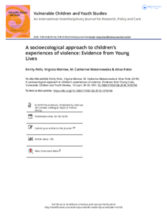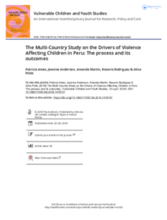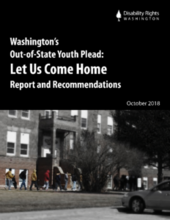This page contains documents and other resources related to children's care in the Americas. Browse resources by region, country, or category.
Displaying 1591 - 1600 of 3116
In the current study, the authors examined whether children with Child Protective Services (CPS) involvement who were in foster care had more advanced receptive vocabulary than children with CPS involvement who resided with their birth parents.
"One in five children being raised by extended family members [in the US] — grandparents, aunts, uncles, cousins — live in an immigrant household, more than half a million children, a new report shows," says this article from the Huffington Post.
In the present study, the authors examined the effects of two types of initial short-term placements: emergency placements (lasting 1 to 5 days) and provisional placements (lasting 6 to 60 days) on the risks of re-entry into care in the four years following reunification.
This opinion piece from the New York Times presents alternatives to volunteering in, or donating to, orphanages.
This paper highlights findings from a a 15-year longitudinal cohort study of children growing up in poverty in Ethiopia, India, Peru and Vietnam.
This article presents the Peru results as part of the Multi Country Study on the Drivers of Violence Affecting Children.
This study sought to answer the question: How do the experiences of separation and reunification shape the well‐being of immigrant children?
The US state of Washington’s foster care system has been sending many young people in need of residential care and treatment to the Clarinda Academy, an institution in Iowa. This is a report by Disability Rights Washington (DRW) to expose the conditions and treatment experienced by Washington foster youth at this institution.
The Together for Families Conference is a unique new opportunity to gather various stakeholders from across the U.S. in the Family Support and Strengthening Field.
This project attempts to put numbers on the foster care capacity in each state in the US.




